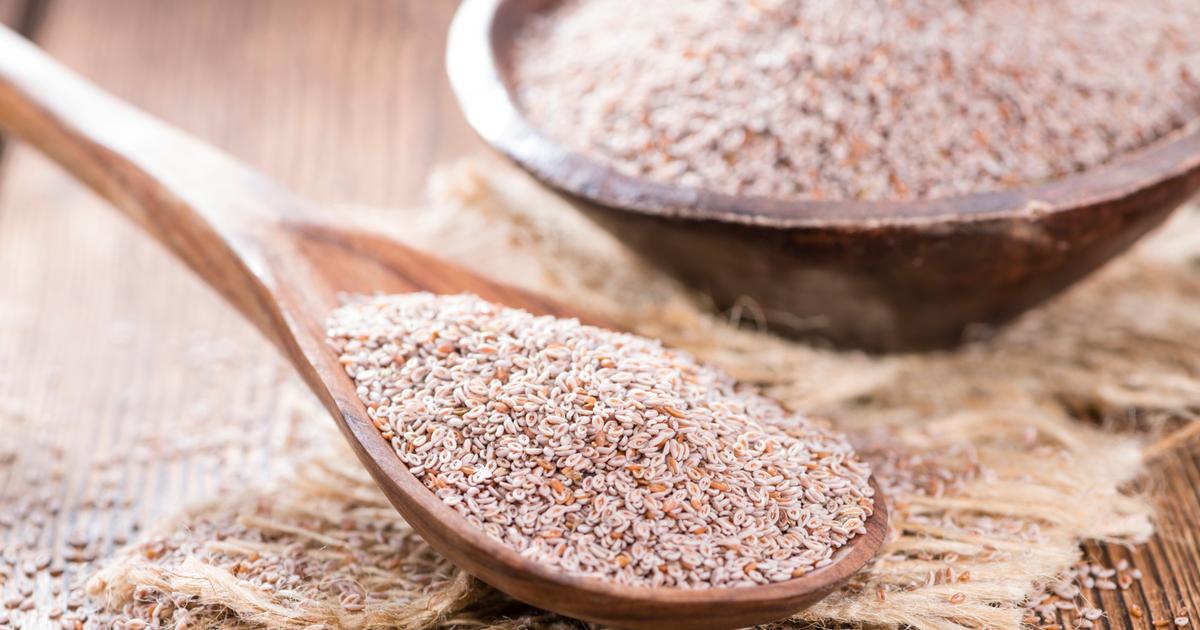When found in bulk, psyllium powder looks just like almond or even coconut powder.
However, the flavor of this herbaceous plant native to North Africa and South Asia is really not so marked, some even consider it rather bland.
On the other hand, its virtues make it an ally of choice to improve intestinal comfort.
Thanks to its incredible absorption capacity - transformed psyllium swells on contact with water - it is effective in improving certain digestive disorders.
Explanations.
Read alsoThe keys to learning from your intestine and putting an end to stomach aches
Good for transit
In the
Plantaginaceae
family , there are two varieties of psyllium, one recognizable by its black/red color, coming from Provence, and the other, which interests us here, the
Plantago ovata
or more commonly called blond psyllium.
This plant consists of long leaves and stems with at their end a fruit containing seeds.
In practice, the envelope of these seeds, the "tegument", is the one used for food consumption.
It contains a mucilage, a vegetable substance rich in soluble fiber which will, with good hydration, increase the volume of stools and help to evacuate them.
"Unlike irritating laxatives based on anthraquinone, a molecule found in certain plants such as senna, cascara, buckthorn or rhubarb, psyllium is a gentle, natural, scientifically validated and safe laxative", explains William Berrebi, gastroenterologist, hepatologist and author of the book
Microbiotic Medicine
(1).
To a lesser extent, its absorbency can also act “like a sponge against loose stools and help in the event of temporary diarrhea, adds Faïza Bossy, general practitioner and nutritionist.
In video, the keys to taking care of your intestine
A barrier gel
Psyllium also plays a protective role here below thanks to its soluble fibers.
The latter represent in particular food, prebiotics, for the friendly bacteria of our microbiota.
Also, under the effect of humidity, they will form "a gel which will line the intestinal mucosa and prevent the passage of toxic substances into the bloodstream", adds Dr. William Berrebi.
The transit thus facilitated by this work, would decrease the absorption of sugars and fats.
“Some studies suggest a presupposed role of psyllium in the ability to regulate blood sugar levels and thus see a preventive effect in type 2 diabetes, reports general practitioner Faïza Bossy.
Also, by reducing total cholesterol and triglycerides
(fat molecules present in the blood, editor’s note
), it acts on cardiovascular risk.
How to consume psyllium?
According to the two health professionals, the use of psyllium must be done under medical supervision.
“It is recommended in cases of isolated chronic constipation or that associated with irritable bowel syndrome.
If effects are observed after 12 to 48 hours after the first intake, this treatment can last for weeks, even several months to improve digestive comfort”, underlines the gastroenterologist William Berrebi.
To get it, go to a pharmacy or organic stores.
“It can be consumed either in powder, at the rate of a teaspoon morning, noon and evening, or 2 to 3 sachets per day, to be mixed or effervescent.
In any case, it is drunk with a large glass of water to produce the expected dissolving effect, reports the specialist.
"In total, you should not exceed 40 grams daily," adds Dr. Faïza Bossy.
Contraindications
Apart from symptoms of chronic constipation, namely less than three stools (hard or soft) per week with significant pushing efforts, the consumption of psyllium is not recommended, insist the specialists.
"If we are looking for prebiotics, for example, we can find them in whole grains, legumes, vegetables or fresh fruits," says gastroenterologist William Berrebi.
In case of doubt, discomfort or persistent pain, a medical consultation is strongly advised.
"Psyllium can aggravate intestinal obstruction, pathologies such as intestinal stenosis (
narrowing of part of the intestine, editor's note
) or Crohn's disease", informs Dr. William Berrebi.
(1)
Microbiotic medicine
, by Dr William Berrebi, Marabout editions, 19.90 euros.

